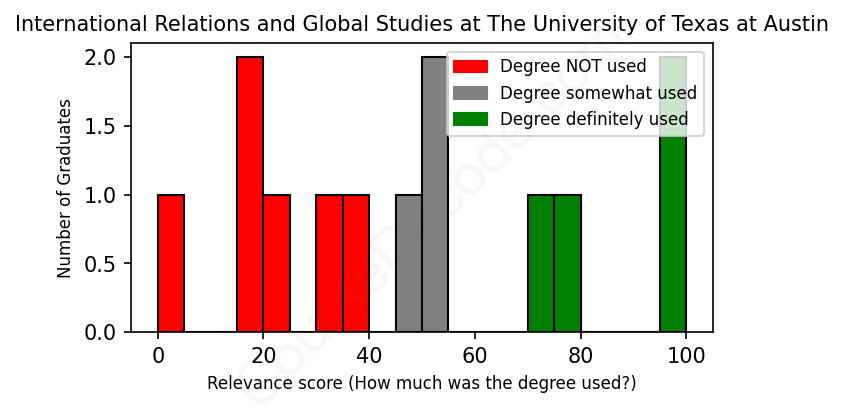
First, some facts. Of the International Relations and Global Studies graduates from The University of Texas at Austin we've analyzed , here's how many have used (or NOT used) their degree in their career:

These are estimates based on AI analysis of 13 LinkedIn profiles (see below).
The verdict? Significantly below average. Overall, with an average relevance score of 48%, International Relations and Global Studies graduates from The University of Texas at Austin have a much lower likelihood (-19%) of finding work in this field compared to the average graduate across all fields:
And for comparison, here's the chart for all profiles we've looked at across all degrees.
Also, after graduating, only 30% of these graduates have pursued further education other than another Bachelor's degree (such as a Masters degree or other), compared to the average across all profiles of 35%. This suggests a Bachelors degree is enough for most International Relations and Global Studies graduates, and it's normal to look for work straight after graduation.
See the details:
|
Relevance score: 100% We think this person has gone into a career highly relevant to their degree. We think this person has gone into a career highly relevant to their degree.
DEGREE INFOGraduated in 2022 from The University of Texas at Austin with a Bachelor of Arts - BA in International Relations and Global Studies. Also pursued further education since (see below). JOB HISTORY SINCE GRADUATIONInaugural Cohort Member of Texas Law Pipeline Program The University of Texas School of Law Jun 2022 - Apr 2023 Social Science/Humanities Research Associate  Edward A. Clark Center for Australian & New Zealand Studies Jun 2022 - Aug 2023 FURTHER DEGREES DONE SINCE GRADUATINGDoctor of Law - JDThe University of Texas School of Law 2023 - 2026 ABOUTI graduated from the University of Texas at Austin in May 2022. I pursued a BA in International Relations and Global Studies major with a focus on International Security and Latin America. I also earned a Business Spanish Certificate, as well as a Certificate in Human Rights and Social Justice from the Bridging Disciplines Program.I have a passion for advocacy and am attending the University of Texas at Austin Law School! |
The top 10 most common jobs done by the graduates we've analyzed (ranked most common to least) are:
Most graduates from the International Relations and Global Studies program at The University of Texas at Austin have ventured into a variety of roles, many of which seem only loosely connected to their degree. For instance, a good number of them have taken up positions in financial analysis, hospitality management, and customer service, which generally prioritize skills like financial acumen, customer relations, and operational management over diplomatic or international policy expertise. Some roles, like those at SHI International Corp. as Microsoft Licensing Executives, incorporate elements related to global business practices, but these are not the primary focus of the job and tend to reflect a more generic commercial environment rather than one centered on international relations.
However, there are notable exceptions where graduates have landed positions that directly engage with the principles of their studies, such as roles in legal assistance or internships with organizations like the Peace Corps. These jobs tend to involve working with international legal frameworks or addressing global issues, which align perfectly with the core learnings of their degree. Overall, it seems that while some graduates have successfully utilized their education in relevant fields, many have found themselves in roles that don’t directly tie back to International Relations and Global Studies, suggesting a mix of applicability and divergence in their career paths.
Here is a visual representation of the most common words in job titles for International Relations and Global Studies graduates (this is across all International Relations and Global Studies graduates we've analyzed, not just those who went to The University of Texas at Austin):

When looking at the career paths of graduates from The University of Texas at Austin with degrees in International Relations and Global Studies, it seems like there's a mixed bag of outcomes. For many, the first job right out of college tends to be in areas like sales, legal assistance, or financial analysis. Some graduates, like those who became Account Executives or worked as Legal Assistants, have started in roles that often come with a more traditional corporate feel but can lack direct ties to their degree. However, others took on roles like Summer Law Clerks, which can be more aligned with their studies and aspirations in international affairs. It appears that some graduates are carving out solid starts in their careers, with jobs that can lead to more impactful roles later on.
Fast forward five to ten years, and while some graduates have transitioned into positions that allow them to leverage their background in International Relations, such as consultants or managerial roles, others have seemed to veer off into areas that are less connected. For instance, some have moved into the hospitality sector or into marketing roles, which might not directly use the skills they honed in their degree. Overall, it appears that while many graduates are on track for successful and relevant careers, others may find themselves in jobs that, while stable, don't necessarily align with their original career goals in international relations and global studies. It's a journey with ups and downs, and while some are thriving in relevant fields, others are exploring various paths that may not directly correlate with their studies.
Honestly, a Bachelor’s degree in International Relations and Global Studies can be pretty challenging, but it really depends on your interests and strengths. At UT Austin, you'll dive into a lot of complex topics like politics, economics, and cultures from around the world, which means there’s a fair amount of reading, writing, and critical thinking involved. It’s definitely not a walk in the park, but if you have a genuine curiosity about global issues and enjoy engaging discussions, it can be super rewarding! Some students find it easier due to their passion for the subject, while others might struggle a bit more with the workload and fast-paced learning. Overall, it's a solid mix of tough and interesting, so be ready to put in some effort!
Most commonly, in the LinkedIn profiles we've looked at, it takes people 4 years to finish a Bachelor degree in International Relations and Global Studies.
From what I can see, it looks like many of these graduates are doing pretty well for themselves after leaving UT Austin, especially those who graduated a bit earlier. For example, the ones who started in finance or in management roles seem to be moving up the ladder and potentially earning decent salaries—having positions like FP&A Senior Manager and General Manager typically come with good paychecks. Others in sectors like tech and law also have promising trajectories, which is a good sign for their future earnings. On the flip side, some recent grads are still in entry-level roles or internships, which might not pay as well initially. Overall, it seems like if they keep growing their experience and moving up, they’re on track to make decent money, especially as they approach their mid-career stages.
Here is a visual representation of the most common words seen in the "about" section of LinkedIn profiles who have a Bachelor degree in International Relations and Global Studies (this is across all International Relations and Global Studies graduates we've analyzed, not just those who went to The University of Texas at Austin). This may or may not be useful:

Here are all colleges offering a Bachelor degree in International Relations and Global Studies (ordered by the average relevance score of their International Relations and Global Studies graduates, best to worst) where we have analyzed at least 10 of their graduates:
| College | Score | Count |
|---|---|---|
 The University of Texas at Austin The University of Texas at Austin
|
48 | 13 |